SNPG950: Analysis of a Nursing Reflective Journal (Part B & C)
VerifiedAdded on 2023/03/30
|12
|2295
|249
Report
AI Summary
This report analyzes a nursing student's reflective journal, focusing on experiences in a geriatric ward and ethical dilemmas encountered during clinical practice. The student utilizes Rolfe's reflective cycle to examine two key themes: the management of a patient with dementia and communication with patients. The analysis highlights instances where the student's actions, such as removing restraints from a patient with dementia, led to unintended consequences. The report also addresses issues of communication, including obtaining patient consent and adhering to professional etiquette. Furthermore, the report examines the importance of honesty in nursing, particularly in a case involving a patient with lactose intolerance. The student reflects on the challenges of maintaining honesty in the face of pressure from colleagues. The report concludes with a discussion of the student's commitment to lifelong learning, patient advocacy, and the need for transparent and honest care, emphasizing the importance of ethical decision-making and adherence to nursing standards.
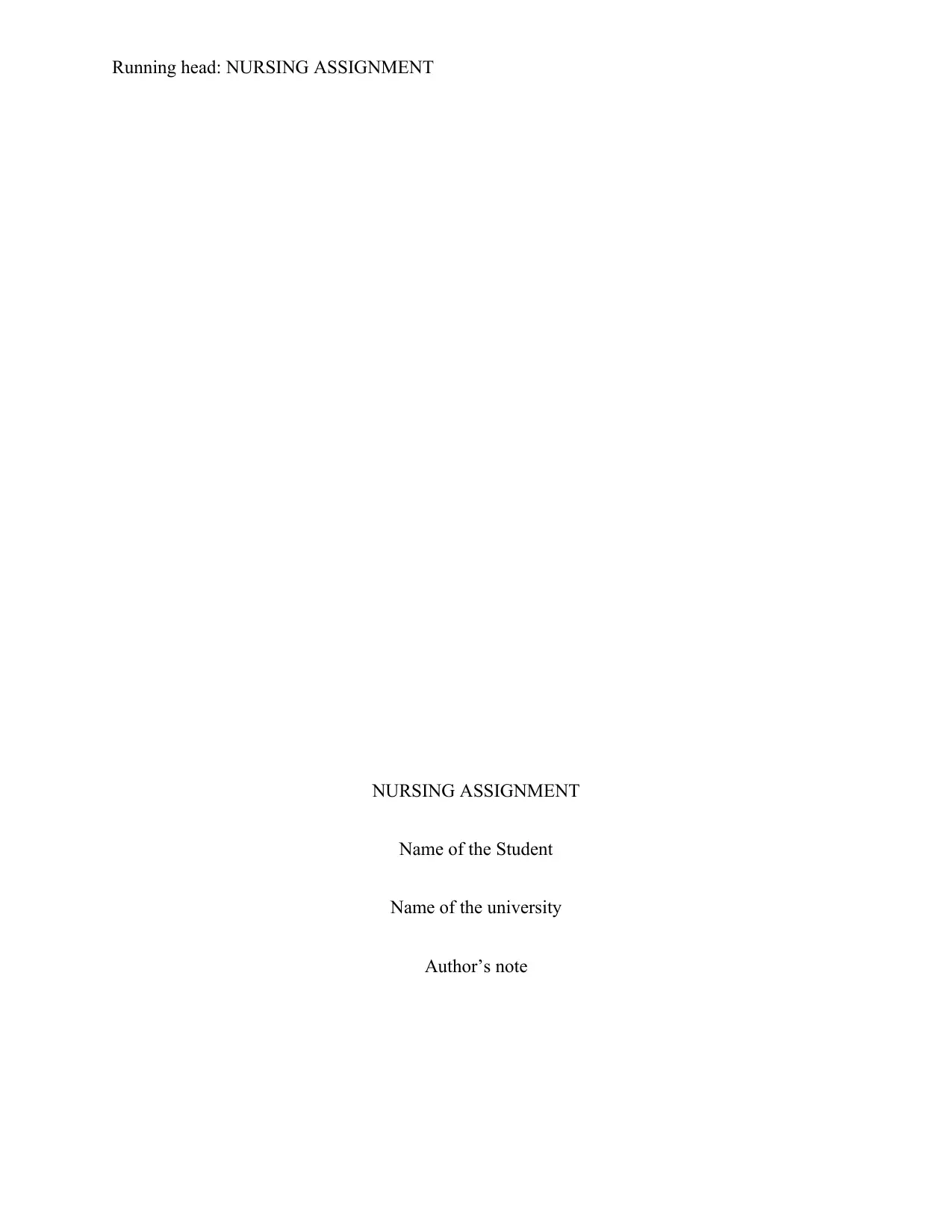
Running head: NURSING ASSIGNMENT
NURSING ASSIGNMENT
Name of the Student
Name of the university
Author’s note
NURSING ASSIGNMENT
Name of the Student
Name of the university
Author’s note
Paraphrase This Document
Need a fresh take? Get an instant paraphrase of this document with our AI Paraphraser
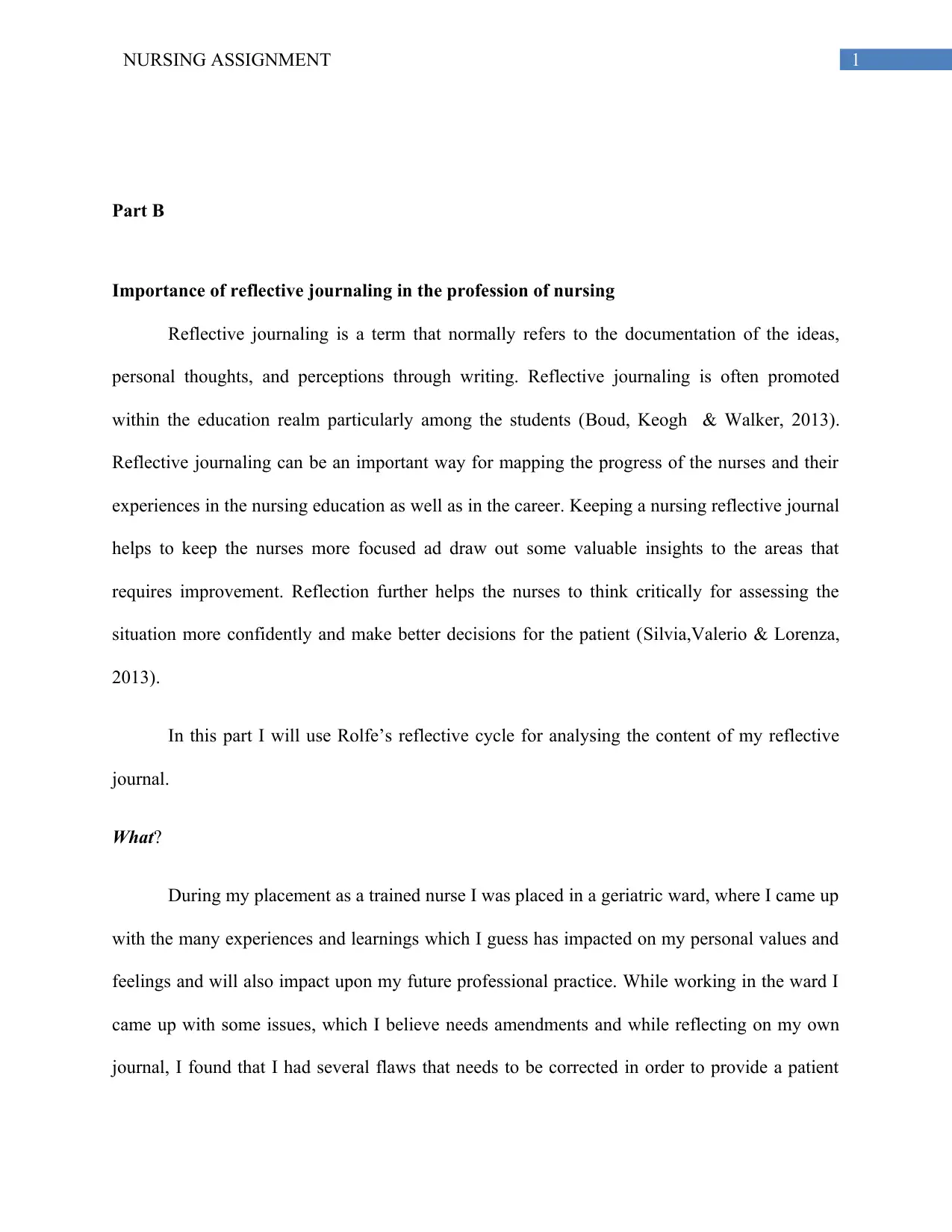
1NURSING ASSIGNMENT
Part B
Importance of reflective journaling in the profession of nursing
Reflective journaling is a term that normally refers to the documentation of the ideas,
personal thoughts, and perceptions through writing. Reflective journaling is often promoted
within the education realm particularly among the students (Boud, Keogh & Walker, 2013).
Reflective journaling can be an important way for mapping the progress of the nurses and their
experiences in the nursing education as well as in the career. Keeping a nursing reflective journal
helps to keep the nurses more focused ad draw out some valuable insights to the areas that
requires improvement. Reflection further helps the nurses to think critically for assessing the
situation more confidently and make better decisions for the patient (Silvia,Valerio & Lorenza,
2013).
In this part I will use Rolfe’s reflective cycle for analysing the content of my reflective
journal.
What?
During my placement as a trained nurse I was placed in a geriatric ward, where I came up
with the many experiences and learnings which I guess has impacted on my personal values and
feelings and will also impact upon my future professional practice. While working in the ward I
came up with some issues, which I believe needs amendments and while reflecting on my own
journal, I found that I had several flaws that needs to be corrected in order to provide a patient
Part B
Importance of reflective journaling in the profession of nursing
Reflective journaling is a term that normally refers to the documentation of the ideas,
personal thoughts, and perceptions through writing. Reflective journaling is often promoted
within the education realm particularly among the students (Boud, Keogh & Walker, 2013).
Reflective journaling can be an important way for mapping the progress of the nurses and their
experiences in the nursing education as well as in the career. Keeping a nursing reflective journal
helps to keep the nurses more focused ad draw out some valuable insights to the areas that
requires improvement. Reflection further helps the nurses to think critically for assessing the
situation more confidently and make better decisions for the patient (Silvia,Valerio & Lorenza,
2013).
In this part I will use Rolfe’s reflective cycle for analysing the content of my reflective
journal.
What?
During my placement as a trained nurse I was placed in a geriatric ward, where I came up
with the many experiences and learnings which I guess has impacted on my personal values and
feelings and will also impact upon my future professional practice. While working in the ward I
came up with some issues, which I believe needs amendments and while reflecting on my own
journal, I found that I had several flaws that needs to be corrected in order to provide a patient
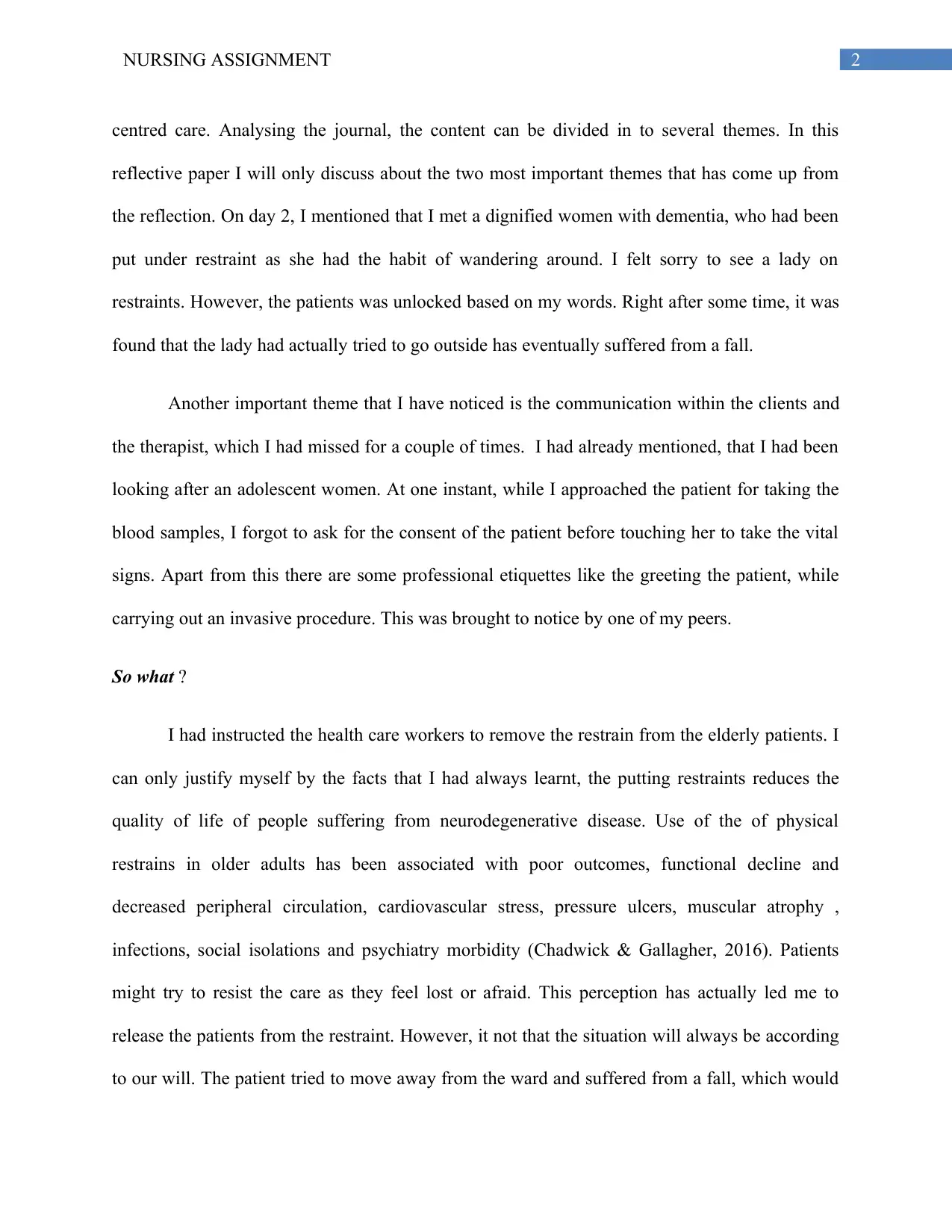
2NURSING ASSIGNMENT
centred care. Analysing the journal, the content can be divided in to several themes. In this
reflective paper I will only discuss about the two most important themes that has come up from
the reflection. On day 2, I mentioned that I met a dignified women with dementia, who had been
put under restraint as she had the habit of wandering around. I felt sorry to see a lady on
restraints. However, the patients was unlocked based on my words. Right after some time, it was
found that the lady had actually tried to go outside has eventually suffered from a fall.
Another important theme that I have noticed is the communication within the clients and
the therapist, which I had missed for a couple of times. I had already mentioned, that I had been
looking after an adolescent women. At one instant, while I approached the patient for taking the
blood samples, I forgot to ask for the consent of the patient before touching her to take the vital
signs. Apart from this there are some professional etiquettes like the greeting the patient, while
carrying out an invasive procedure. This was brought to notice by one of my peers.
So what ?
I had instructed the health care workers to remove the restrain from the elderly patients. I
can only justify myself by the facts that I had always learnt, the putting restraints reduces the
quality of life of people suffering from neurodegenerative disease. Use of the of physical
restrains in older adults has been associated with poor outcomes, functional decline and
decreased peripheral circulation, cardiovascular stress, pressure ulcers, muscular atrophy ,
infections, social isolations and psychiatry morbidity (Chadwick & Gallagher, 2016). Patients
might try to resist the care as they feel lost or afraid. This perception has actually led me to
release the patients from the restraint. However, it not that the situation will always be according
to our will. The patient tried to move away from the ward and suffered from a fall, which would
centred care. Analysing the journal, the content can be divided in to several themes. In this
reflective paper I will only discuss about the two most important themes that has come up from
the reflection. On day 2, I mentioned that I met a dignified women with dementia, who had been
put under restraint as she had the habit of wandering around. I felt sorry to see a lady on
restraints. However, the patients was unlocked based on my words. Right after some time, it was
found that the lady had actually tried to go outside has eventually suffered from a fall.
Another important theme that I have noticed is the communication within the clients and
the therapist, which I had missed for a couple of times. I had already mentioned, that I had been
looking after an adolescent women. At one instant, while I approached the patient for taking the
blood samples, I forgot to ask for the consent of the patient before touching her to take the vital
signs. Apart from this there are some professional etiquettes like the greeting the patient, while
carrying out an invasive procedure. This was brought to notice by one of my peers.
So what ?
I had instructed the health care workers to remove the restrain from the elderly patients. I
can only justify myself by the facts that I had always learnt, the putting restraints reduces the
quality of life of people suffering from neurodegenerative disease. Use of the of physical
restrains in older adults has been associated with poor outcomes, functional decline and
decreased peripheral circulation, cardiovascular stress, pressure ulcers, muscular atrophy ,
infections, social isolations and psychiatry morbidity (Chadwick & Gallagher, 2016). Patients
might try to resist the care as they feel lost or afraid. This perception has actually led me to
release the patients from the restraint. However, it not that the situation will always be according
to our will. The patient tried to move away from the ward and suffered from a fall, which would
⊘ This is a preview!⊘
Do you want full access?
Subscribe today to unlock all pages.

Trusted by 1+ million students worldwide
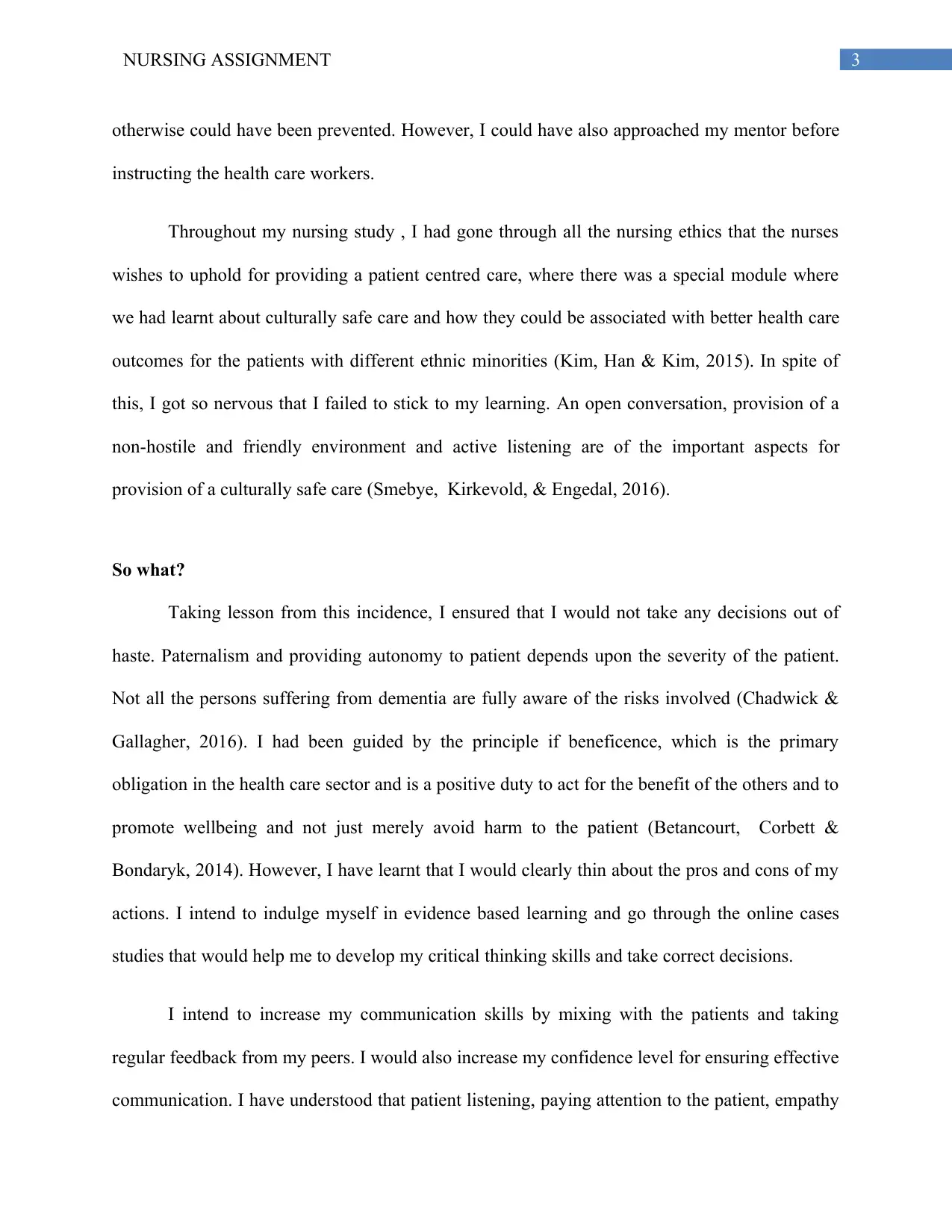
3NURSING ASSIGNMENT
otherwise could have been prevented. However, I could have also approached my mentor before
instructing the health care workers.
Throughout my nursing study , I had gone through all the nursing ethics that the nurses
wishes to uphold for providing a patient centred care, where there was a special module where
we had learnt about culturally safe care and how they could be associated with better health care
outcomes for the patients with different ethnic minorities (Kim, Han & Kim, 2015). In spite of
this, I got so nervous that I failed to stick to my learning. An open conversation, provision of a
non-hostile and friendly environment and active listening are of the important aspects for
provision of a culturally safe care (Smebye, Kirkevold, & Engedal, 2016).
So what?
Taking lesson from this incidence, I ensured that I would not take any decisions out of
haste. Paternalism and providing autonomy to patient depends upon the severity of the patient.
Not all the persons suffering from dementia are fully aware of the risks involved (Chadwick &
Gallagher, 2016). I had been guided by the principle if beneficence, which is the primary
obligation in the health care sector and is a positive duty to act for the benefit of the others and to
promote wellbeing and not just merely avoid harm to the patient (Betancourt, Corbett &
Bondaryk, 2014). However, I have learnt that I would clearly thin about the pros and cons of my
actions. I intend to indulge myself in evidence based learning and go through the online cases
studies that would help me to develop my critical thinking skills and take correct decisions.
I intend to increase my communication skills by mixing with the patients and taking
regular feedback from my peers. I would also increase my confidence level for ensuring effective
communication. I have understood that patient listening, paying attention to the patient, empathy
otherwise could have been prevented. However, I could have also approached my mentor before
instructing the health care workers.
Throughout my nursing study , I had gone through all the nursing ethics that the nurses
wishes to uphold for providing a patient centred care, where there was a special module where
we had learnt about culturally safe care and how they could be associated with better health care
outcomes for the patients with different ethnic minorities (Kim, Han & Kim, 2015). In spite of
this, I got so nervous that I failed to stick to my learning. An open conversation, provision of a
non-hostile and friendly environment and active listening are of the important aspects for
provision of a culturally safe care (Smebye, Kirkevold, & Engedal, 2016).
So what?
Taking lesson from this incidence, I ensured that I would not take any decisions out of
haste. Paternalism and providing autonomy to patient depends upon the severity of the patient.
Not all the persons suffering from dementia are fully aware of the risks involved (Chadwick &
Gallagher, 2016). I had been guided by the principle if beneficence, which is the primary
obligation in the health care sector and is a positive duty to act for the benefit of the others and to
promote wellbeing and not just merely avoid harm to the patient (Betancourt, Corbett &
Bondaryk, 2014). However, I have learnt that I would clearly thin about the pros and cons of my
actions. I intend to indulge myself in evidence based learning and go through the online cases
studies that would help me to develop my critical thinking skills and take correct decisions.
I intend to increase my communication skills by mixing with the patients and taking
regular feedback from my peers. I would also increase my confidence level for ensuring effective
communication. I have understood that patient listening, paying attention to the patient, empathy
Paraphrase This Document
Need a fresh take? Get an instant paraphrase of this document with our AI Paraphraser
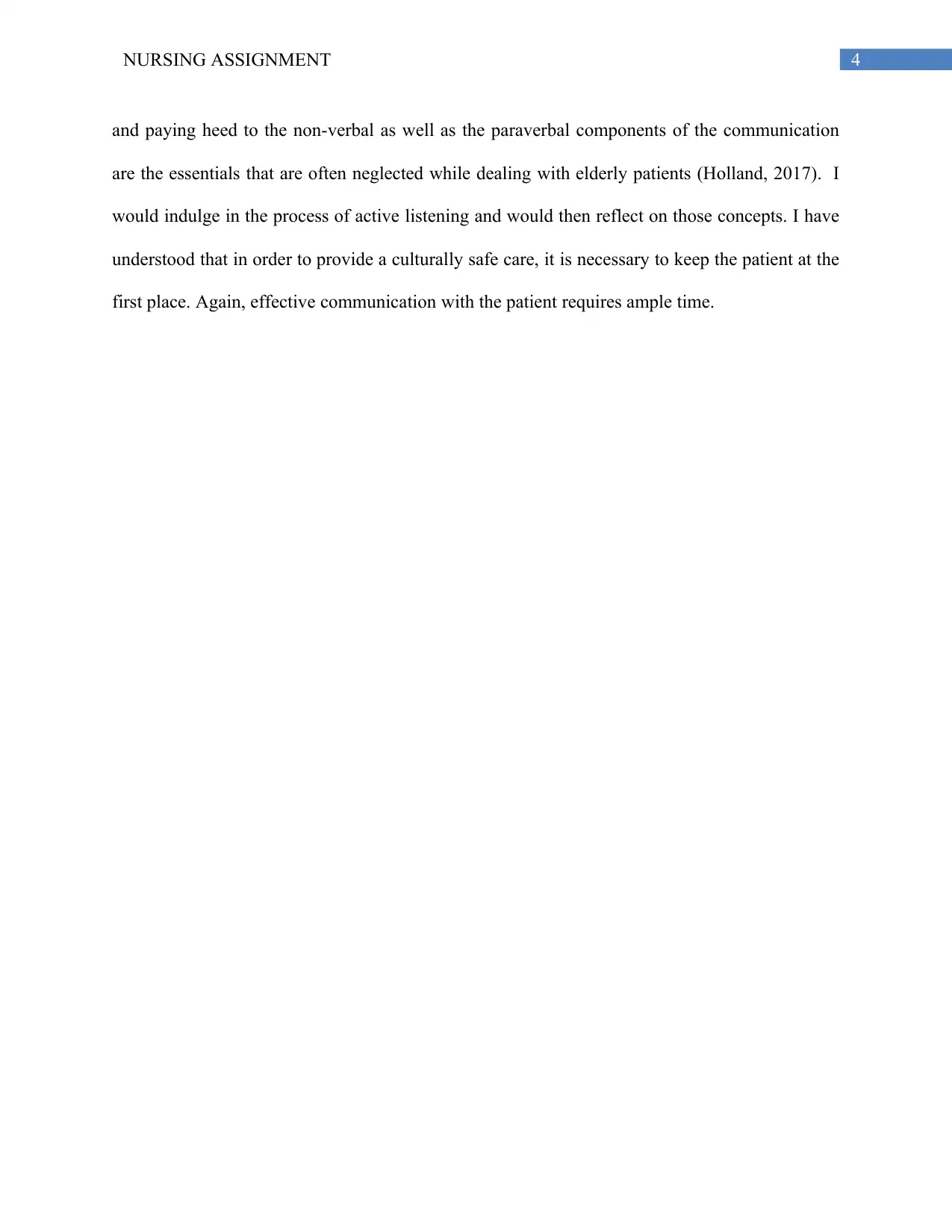
4NURSING ASSIGNMENT
and paying heed to the non-verbal as well as the paraverbal components of the communication
are the essentials that are often neglected while dealing with elderly patients (Holland, 2017). I
would indulge in the process of active listening and would then reflect on those concepts. I have
understood that in order to provide a culturally safe care, it is necessary to keep the patient at the
first place. Again, effective communication with the patient requires ample time.
and paying heed to the non-verbal as well as the paraverbal components of the communication
are the essentials that are often neglected while dealing with elderly patients (Holland, 2017). I
would indulge in the process of active listening and would then reflect on those concepts. I have
understood that in order to provide a culturally safe care, it is necessary to keep the patient at the
first place. Again, effective communication with the patient requires ample time.
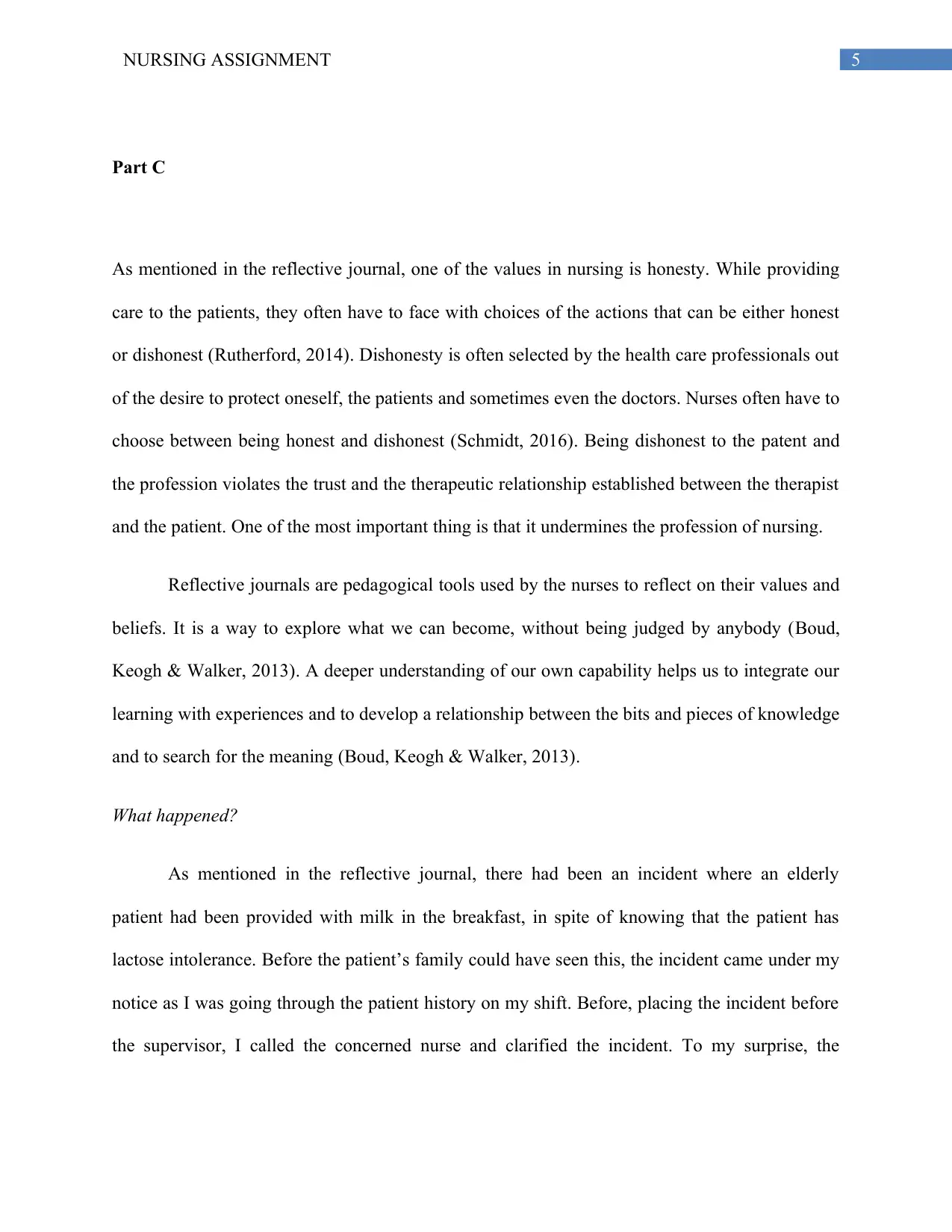
5NURSING ASSIGNMENT
Part C
As mentioned in the reflective journal, one of the values in nursing is honesty. While providing
care to the patients, they often have to face with choices of the actions that can be either honest
or dishonest (Rutherford, 2014). Dishonesty is often selected by the health care professionals out
of the desire to protect oneself, the patients and sometimes even the doctors. Nurses often have to
choose between being honest and dishonest (Schmidt, 2016). Being dishonest to the patent and
the profession violates the trust and the therapeutic relationship established between the therapist
and the patient. One of the most important thing is that it undermines the profession of nursing.
Reflective journals are pedagogical tools used by the nurses to reflect on their values and
beliefs. It is a way to explore what we can become, without being judged by anybody (Boud,
Keogh & Walker, 2013). A deeper understanding of our own capability helps us to integrate our
learning with experiences and to develop a relationship between the bits and pieces of knowledge
and to search for the meaning (Boud, Keogh & Walker, 2013).
What happened?
As mentioned in the reflective journal, there had been an incident where an elderly
patient had been provided with milk in the breakfast, in spite of knowing that the patient has
lactose intolerance. Before the patient’s family could have seen this, the incident came under my
notice as I was going through the patient history on my shift. Before, placing the incident before
the supervisor, I called the concerned nurse and clarified the incident. To my surprise, the
Part C
As mentioned in the reflective journal, one of the values in nursing is honesty. While providing
care to the patients, they often have to face with choices of the actions that can be either honest
or dishonest (Rutherford, 2014). Dishonesty is often selected by the health care professionals out
of the desire to protect oneself, the patients and sometimes even the doctors. Nurses often have to
choose between being honest and dishonest (Schmidt, 2016). Being dishonest to the patent and
the profession violates the trust and the therapeutic relationship established between the therapist
and the patient. One of the most important thing is that it undermines the profession of nursing.
Reflective journals are pedagogical tools used by the nurses to reflect on their values and
beliefs. It is a way to explore what we can become, without being judged by anybody (Boud,
Keogh & Walker, 2013). A deeper understanding of our own capability helps us to integrate our
learning with experiences and to develop a relationship between the bits and pieces of knowledge
and to search for the meaning (Boud, Keogh & Walker, 2013).
What happened?
As mentioned in the reflective journal, there had been an incident where an elderly
patient had been provided with milk in the breakfast, in spite of knowing that the patient has
lactose intolerance. Before the patient’s family could have seen this, the incident came under my
notice as I was going through the patient history on my shift. Before, placing the incident before
the supervisor, I called the concerned nurse and clarified the incident. To my surprise, the
⊘ This is a preview!⊘
Do you want full access?
Subscribe today to unlock all pages.

Trusted by 1+ million students worldwide
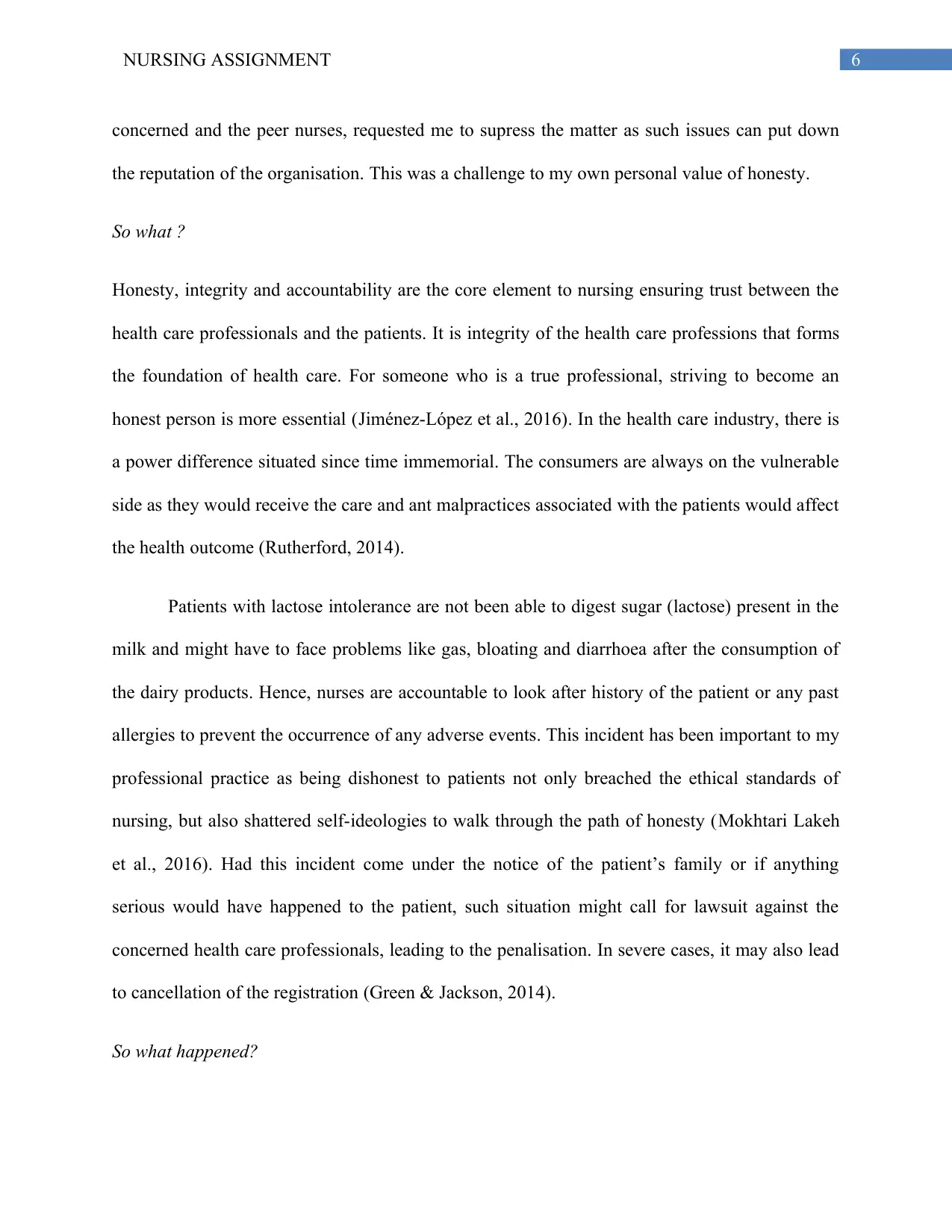
6NURSING ASSIGNMENT
concerned and the peer nurses, requested me to supress the matter as such issues can put down
the reputation of the organisation. This was a challenge to my own personal value of honesty.
So what ?
Honesty, integrity and accountability are the core element to nursing ensuring trust between the
health care professionals and the patients. It is integrity of the health care professions that forms
the foundation of health care. For someone who is a true professional, striving to become an
honest person is more essential (Jiménez-López et al., 2016). In the health care industry, there is
a power difference situated since time immemorial. The consumers are always on the vulnerable
side as they would receive the care and ant malpractices associated with the patients would affect
the health outcome (Rutherford, 2014).
Patients with lactose intolerance are not been able to digest sugar (lactose) present in the
milk and might have to face problems like gas, bloating and diarrhoea after the consumption of
the dairy products. Hence, nurses are accountable to look after history of the patient or any past
allergies to prevent the occurrence of any adverse events. This incident has been important to my
professional practice as being dishonest to patients not only breached the ethical standards of
nursing, but also shattered self-ideologies to walk through the path of honesty (Mokhtari Lakeh
et al., 2016). Had this incident come under the notice of the patient’s family or if anything
serious would have happened to the patient, such situation might call for lawsuit against the
concerned health care professionals, leading to the penalisation. In severe cases, it may also lead
to cancellation of the registration (Green & Jackson, 2014).
So what happened?
concerned and the peer nurses, requested me to supress the matter as such issues can put down
the reputation of the organisation. This was a challenge to my own personal value of honesty.
So what ?
Honesty, integrity and accountability are the core element to nursing ensuring trust between the
health care professionals and the patients. It is integrity of the health care professions that forms
the foundation of health care. For someone who is a true professional, striving to become an
honest person is more essential (Jiménez-López et al., 2016). In the health care industry, there is
a power difference situated since time immemorial. The consumers are always on the vulnerable
side as they would receive the care and ant malpractices associated with the patients would affect
the health outcome (Rutherford, 2014).
Patients with lactose intolerance are not been able to digest sugar (lactose) present in the
milk and might have to face problems like gas, bloating and diarrhoea after the consumption of
the dairy products. Hence, nurses are accountable to look after history of the patient or any past
allergies to prevent the occurrence of any adverse events. This incident has been important to my
professional practice as being dishonest to patients not only breached the ethical standards of
nursing, but also shattered self-ideologies to walk through the path of honesty (Mokhtari Lakeh
et al., 2016). Had this incident come under the notice of the patient’s family or if anything
serious would have happened to the patient, such situation might call for lawsuit against the
concerned health care professionals, leading to the penalisation. In severe cases, it may also lead
to cancellation of the registration (Green & Jackson, 2014).
So what happened?
Paraphrase This Document
Need a fresh take? Get an instant paraphrase of this document with our AI Paraphraser
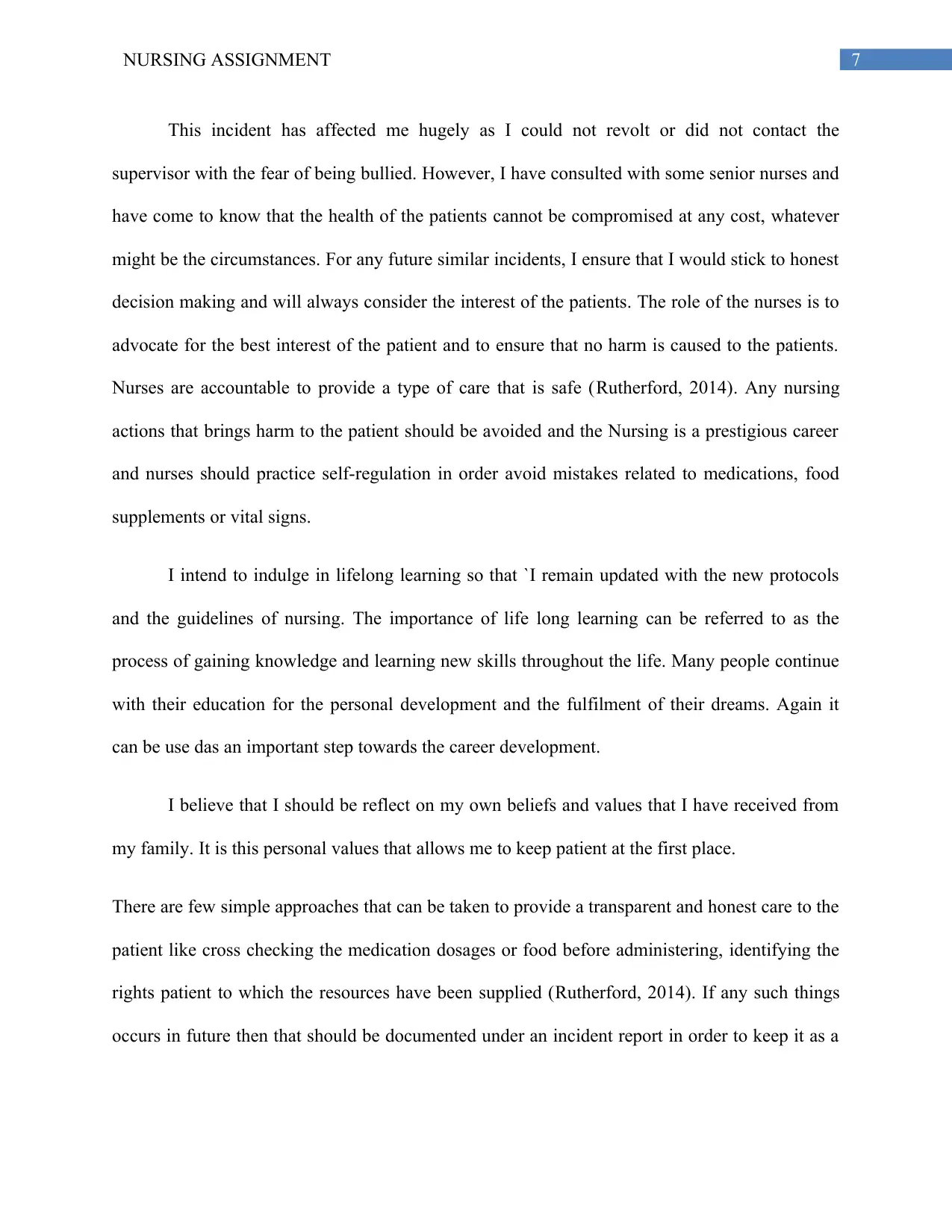
7NURSING ASSIGNMENT
This incident has affected me hugely as I could not revolt or did not contact the
supervisor with the fear of being bullied. However, I have consulted with some senior nurses and
have come to know that the health of the patients cannot be compromised at any cost, whatever
might be the circumstances. For any future similar incidents, I ensure that I would stick to honest
decision making and will always consider the interest of the patients. The role of the nurses is to
advocate for the best interest of the patient and to ensure that no harm is caused to the patients.
Nurses are accountable to provide a type of care that is safe (Rutherford, 2014). Any nursing
actions that brings harm to the patient should be avoided and the Nursing is a prestigious career
and nurses should practice self-regulation in order avoid mistakes related to medications, food
supplements or vital signs.
I intend to indulge in lifelong learning so that `I remain updated with the new protocols
and the guidelines of nursing. The importance of life long learning can be referred to as the
process of gaining knowledge and learning new skills throughout the life. Many people continue
with their education for the personal development and the fulfilment of their dreams. Again it
can be use das an important step towards the career development.
I believe that I should be reflect on my own beliefs and values that I have received from
my family. It is this personal values that allows me to keep patient at the first place.
There are few simple approaches that can be taken to provide a transparent and honest care to the
patient like cross checking the medication dosages or food before administering, identifying the
rights patient to which the resources have been supplied (Rutherford, 2014). If any such things
occurs in future then that should be documented under an incident report in order to keep it as a
This incident has affected me hugely as I could not revolt or did not contact the
supervisor with the fear of being bullied. However, I have consulted with some senior nurses and
have come to know that the health of the patients cannot be compromised at any cost, whatever
might be the circumstances. For any future similar incidents, I ensure that I would stick to honest
decision making and will always consider the interest of the patients. The role of the nurses is to
advocate for the best interest of the patient and to ensure that no harm is caused to the patients.
Nurses are accountable to provide a type of care that is safe (Rutherford, 2014). Any nursing
actions that brings harm to the patient should be avoided and the Nursing is a prestigious career
and nurses should practice self-regulation in order avoid mistakes related to medications, food
supplements or vital signs.
I intend to indulge in lifelong learning so that `I remain updated with the new protocols
and the guidelines of nursing. The importance of life long learning can be referred to as the
process of gaining knowledge and learning new skills throughout the life. Many people continue
with their education for the personal development and the fulfilment of their dreams. Again it
can be use das an important step towards the career development.
I believe that I should be reflect on my own beliefs and values that I have received from
my family. It is this personal values that allows me to keep patient at the first place.
There are few simple approaches that can be taken to provide a transparent and honest care to the
patient like cross checking the medication dosages or food before administering, identifying the
rights patient to which the resources have been supplied (Rutherford, 2014). If any such things
occurs in future then that should be documented under an incident report in order to keep it as a
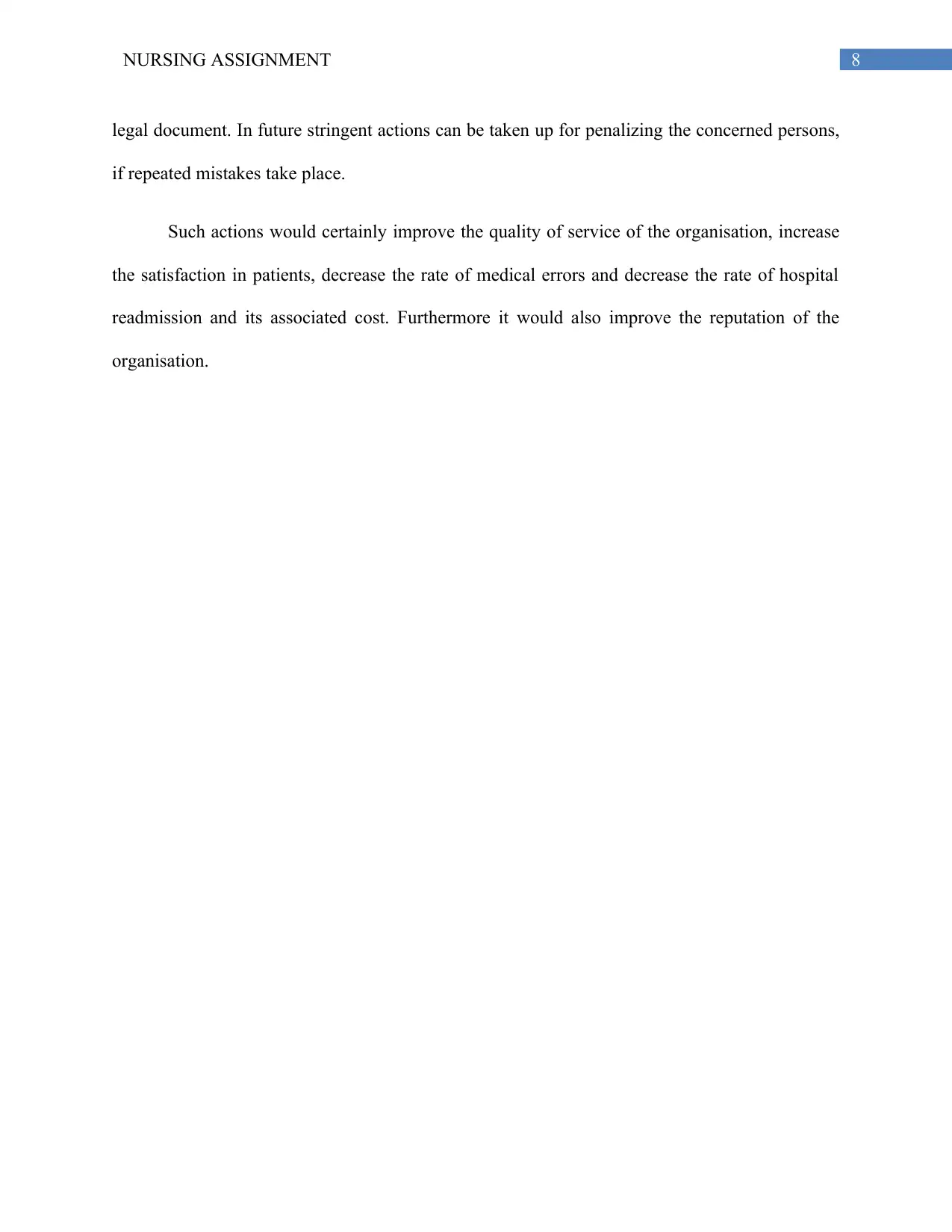
8NURSING ASSIGNMENT
legal document. In future stringent actions can be taken up for penalizing the concerned persons,
if repeated mistakes take place.
Such actions would certainly improve the quality of service of the organisation, increase
the satisfaction in patients, decrease the rate of medical errors and decrease the rate of hospital
readmission and its associated cost. Furthermore it would also improve the reputation of the
organisation.
legal document. In future stringent actions can be taken up for penalizing the concerned persons,
if repeated mistakes take place.
Such actions would certainly improve the quality of service of the organisation, increase
the satisfaction in patients, decrease the rate of medical errors and decrease the rate of hospital
readmission and its associated cost. Furthermore it would also improve the reputation of the
organisation.
⊘ This is a preview!⊘
Do you want full access?
Subscribe today to unlock all pages.

Trusted by 1+ million students worldwide
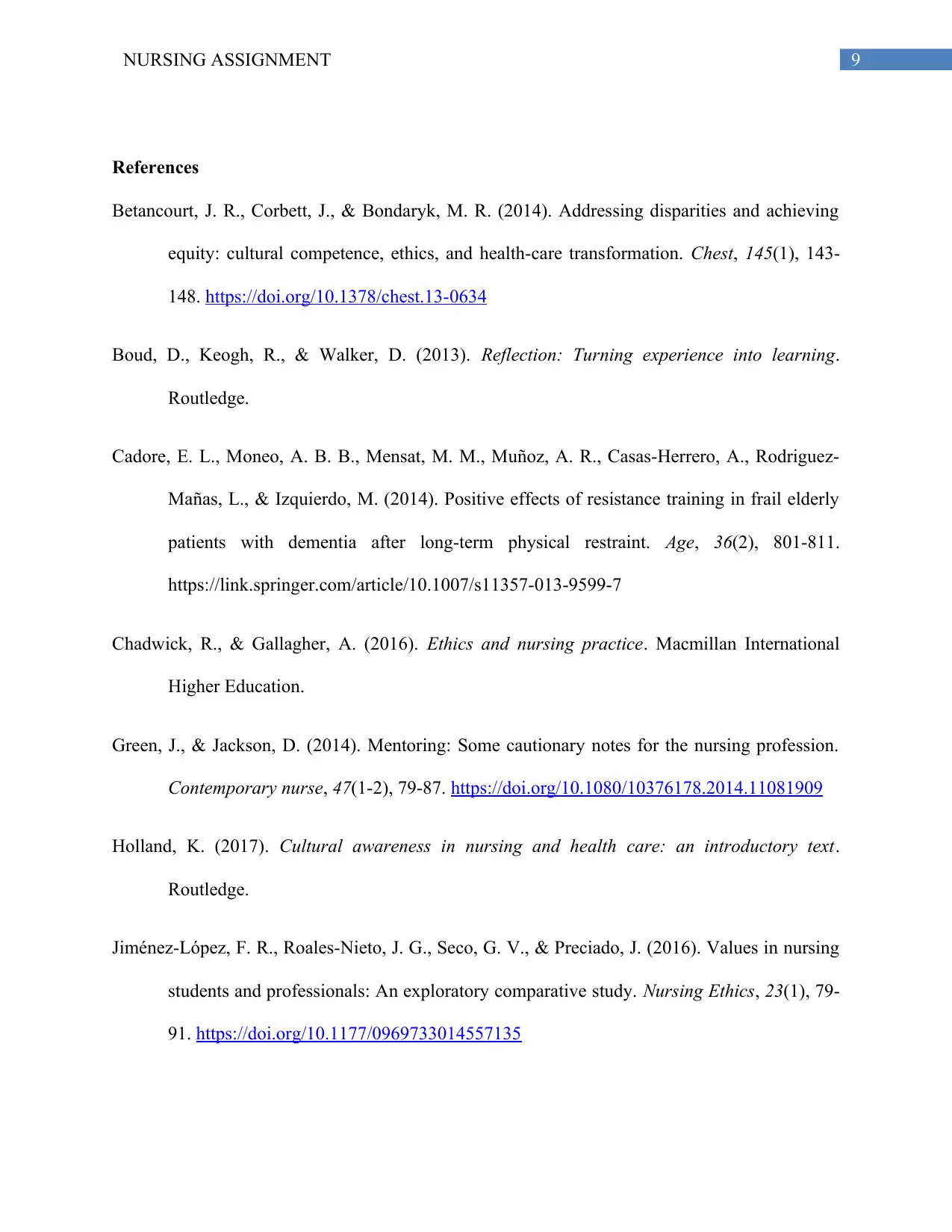
9NURSING ASSIGNMENT
References
Betancourt, J. R., Corbett, J., & Bondaryk, M. R. (2014). Addressing disparities and achieving
equity: cultural competence, ethics, and health-care transformation. Chest, 145(1), 143-
148. https://doi.org/10.1378/chest.13-0634
Boud, D., Keogh, R., & Walker, D. (2013). Reflection: Turning experience into learning.
Routledge.
Cadore, E. L., Moneo, A. B. B., Mensat, M. M., Muñoz, A. R., Casas-Herrero, A., Rodriguez-
Mañas, L., & Izquierdo, M. (2014). Positive effects of resistance training in frail elderly
patients with dementia after long-term physical restraint. Age, 36(2), 801-811.
https://link.springer.com/article/10.1007/s11357-013-9599-7
Chadwick, R., & Gallagher, A. (2016). Ethics and nursing practice. Macmillan International
Higher Education.
Green, J., & Jackson, D. (2014). Mentoring: Some cautionary notes for the nursing profession.
Contemporary nurse, 47(1-2), 79-87. https://doi.org/10.1080/10376178.2014.11081909
Holland, K. (2017). Cultural awareness in nursing and health care: an introductory text.
Routledge.
Jiménez-López, F. R., Roales-Nieto, J. G., Seco, G. V., & Preciado, J. (2016). Values in nursing
students and professionals: An exploratory comparative study. Nursing Ethics, 23(1), 79-
91. https://doi.org/10.1177/0969733014557135
References
Betancourt, J. R., Corbett, J., & Bondaryk, M. R. (2014). Addressing disparities and achieving
equity: cultural competence, ethics, and health-care transformation. Chest, 145(1), 143-
148. https://doi.org/10.1378/chest.13-0634
Boud, D., Keogh, R., & Walker, D. (2013). Reflection: Turning experience into learning.
Routledge.
Cadore, E. L., Moneo, A. B. B., Mensat, M. M., Muñoz, A. R., Casas-Herrero, A., Rodriguez-
Mañas, L., & Izquierdo, M. (2014). Positive effects of resistance training in frail elderly
patients with dementia after long-term physical restraint. Age, 36(2), 801-811.
https://link.springer.com/article/10.1007/s11357-013-9599-7
Chadwick, R., & Gallagher, A. (2016). Ethics and nursing practice. Macmillan International
Higher Education.
Green, J., & Jackson, D. (2014). Mentoring: Some cautionary notes for the nursing profession.
Contemporary nurse, 47(1-2), 79-87. https://doi.org/10.1080/10376178.2014.11081909
Holland, K. (2017). Cultural awareness in nursing and health care: an introductory text.
Routledge.
Jiménez-López, F. R., Roales-Nieto, J. G., Seco, G. V., & Preciado, J. (2016). Values in nursing
students and professionals: An exploratory comparative study. Nursing Ethics, 23(1), 79-
91. https://doi.org/10.1177/0969733014557135
Paraphrase This Document
Need a fresh take? Get an instant paraphrase of this document with our AI Paraphraser
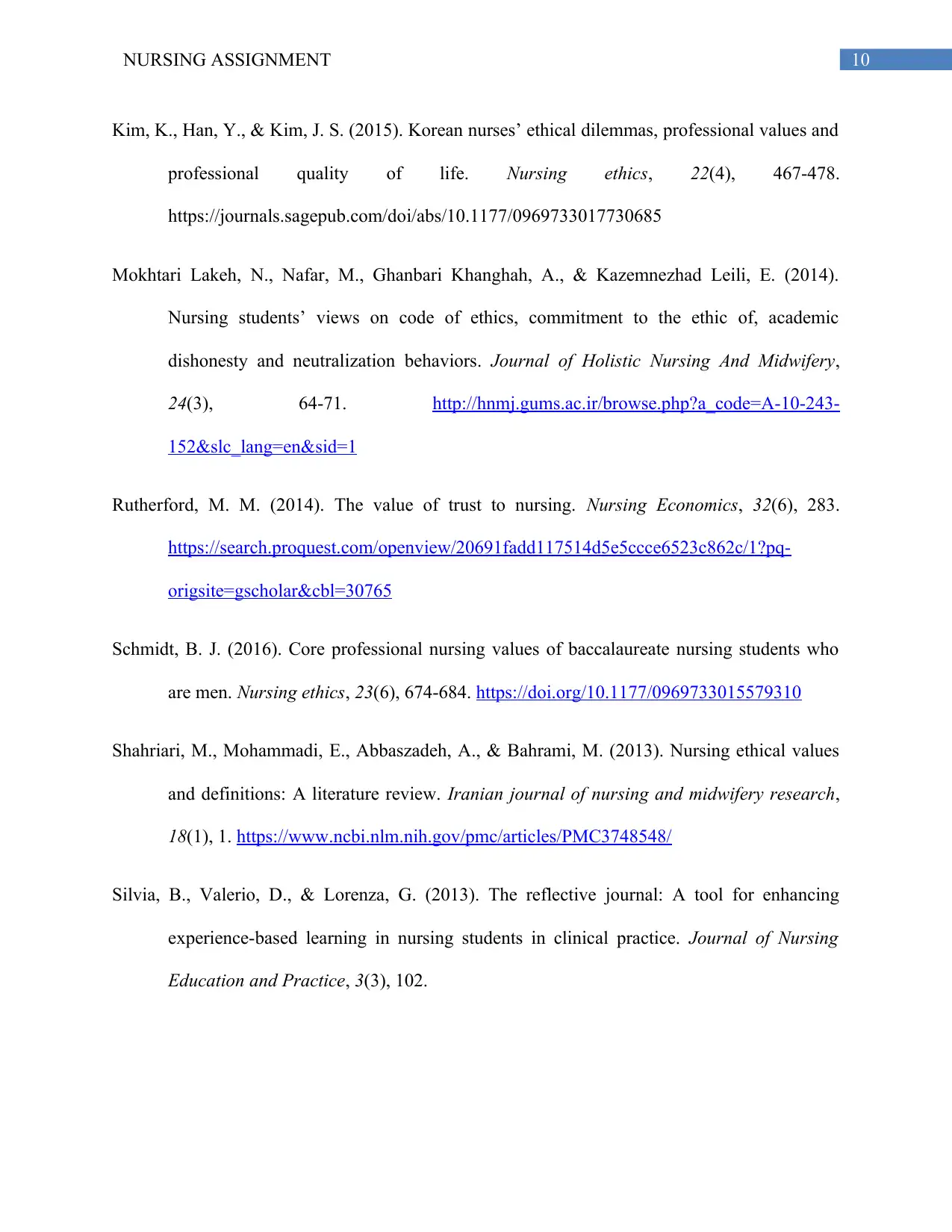
10NURSING ASSIGNMENT
Kim, K., Han, Y., & Kim, J. S. (2015). Korean nurses’ ethical dilemmas, professional values and
professional quality of life. Nursing ethics, 22(4), 467-478.
https://journals.sagepub.com/doi/abs/10.1177/0969733017730685
Mokhtari Lakeh, N., Nafar, M., Ghanbari Khanghah, A., & Kazemnezhad Leili, E. (2014).
Nursing students’ views on code of ethics, commitment to the ethic of, academic
dishonesty and neutralization behaviors. Journal of Holistic Nursing And Midwifery,
24(3), 64-71. http://hnmj.gums.ac.ir/browse.php?a_code=A-10-243-
152&slc_lang=en&sid=1
Rutherford, M. M. (2014). The value of trust to nursing. Nursing Economics, 32(6), 283.
https://search.proquest.com/openview/20691fadd117514d5e5ccce6523c862c/1?pq-
origsite=gscholar&cbl=30765
Schmidt, B. J. (2016). Core professional nursing values of baccalaureate nursing students who
are men. Nursing ethics, 23(6), 674-684. https://doi.org/10.1177/0969733015579310
Shahriari, M., Mohammadi, E., Abbaszadeh, A., & Bahrami, M. (2013). Nursing ethical values
and definitions: A literature review. Iranian journal of nursing and midwifery research,
18(1), 1. https://www.ncbi.nlm.nih.gov/pmc/articles/PMC3748548/
Silvia, B., Valerio, D., & Lorenza, G. (2013). The reflective journal: A tool for enhancing
experience-based learning in nursing students in clinical practice. Journal of Nursing
Education and Practice, 3(3), 102.
Kim, K., Han, Y., & Kim, J. S. (2015). Korean nurses’ ethical dilemmas, professional values and
professional quality of life. Nursing ethics, 22(4), 467-478.
https://journals.sagepub.com/doi/abs/10.1177/0969733017730685
Mokhtari Lakeh, N., Nafar, M., Ghanbari Khanghah, A., & Kazemnezhad Leili, E. (2014).
Nursing students’ views on code of ethics, commitment to the ethic of, academic
dishonesty and neutralization behaviors. Journal of Holistic Nursing And Midwifery,
24(3), 64-71. http://hnmj.gums.ac.ir/browse.php?a_code=A-10-243-
152&slc_lang=en&sid=1
Rutherford, M. M. (2014). The value of trust to nursing. Nursing Economics, 32(6), 283.
https://search.proquest.com/openview/20691fadd117514d5e5ccce6523c862c/1?pq-
origsite=gscholar&cbl=30765
Schmidt, B. J. (2016). Core professional nursing values of baccalaureate nursing students who
are men. Nursing ethics, 23(6), 674-684. https://doi.org/10.1177/0969733015579310
Shahriari, M., Mohammadi, E., Abbaszadeh, A., & Bahrami, M. (2013). Nursing ethical values
and definitions: A literature review. Iranian journal of nursing and midwifery research,
18(1), 1. https://www.ncbi.nlm.nih.gov/pmc/articles/PMC3748548/
Silvia, B., Valerio, D., & Lorenza, G. (2013). The reflective journal: A tool for enhancing
experience-based learning in nursing students in clinical practice. Journal of Nursing
Education and Practice, 3(3), 102.
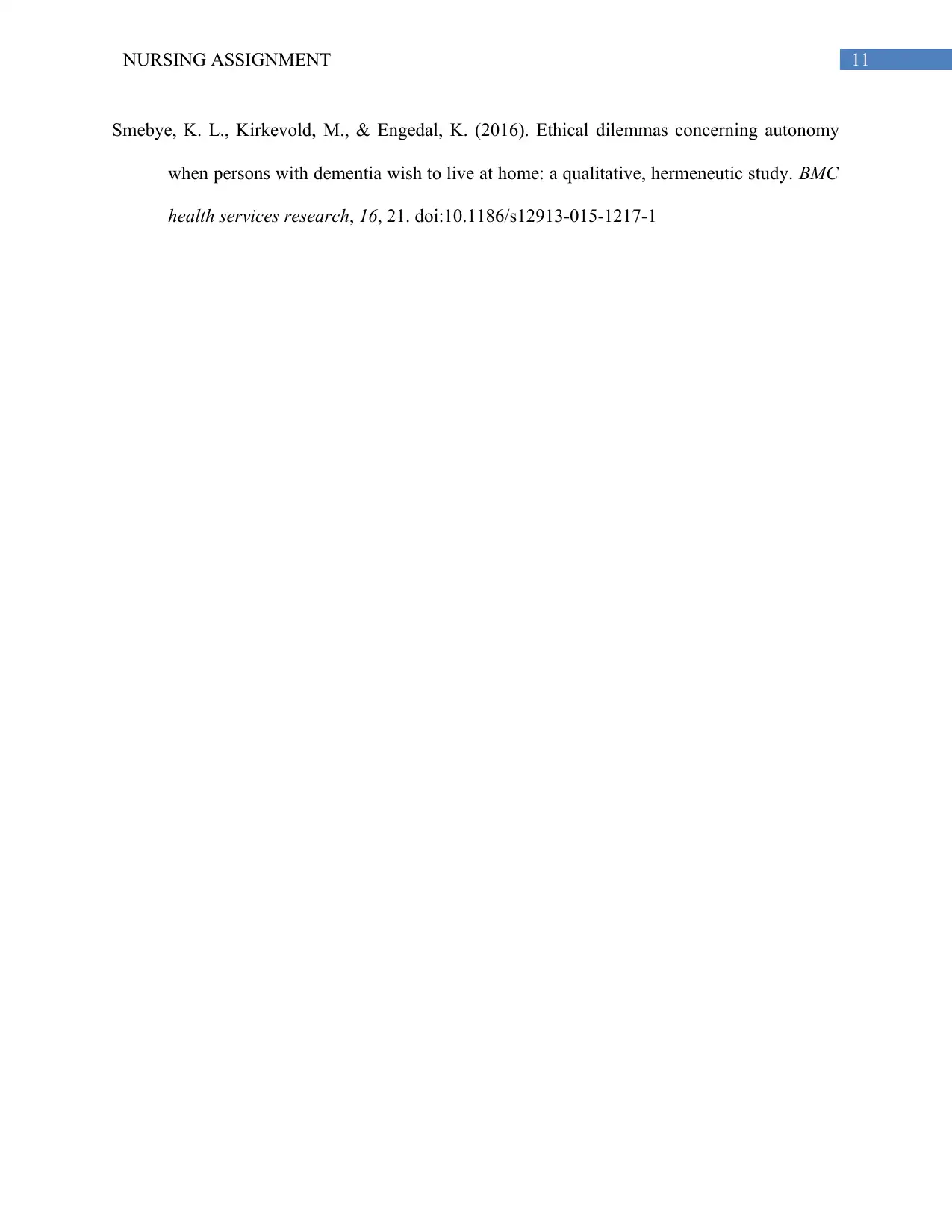
11NURSING ASSIGNMENT
Smebye, K. L., Kirkevold, M., & Engedal, K. (2016). Ethical dilemmas concerning autonomy
when persons with dementia wish to live at home: a qualitative, hermeneutic study. BMC
health services research, 16, 21. doi:10.1186/s12913-015-1217-1
Smebye, K. L., Kirkevold, M., & Engedal, K. (2016). Ethical dilemmas concerning autonomy
when persons with dementia wish to live at home: a qualitative, hermeneutic study. BMC
health services research, 16, 21. doi:10.1186/s12913-015-1217-1
⊘ This is a preview!⊘
Do you want full access?
Subscribe today to unlock all pages.

Trusted by 1+ million students worldwide
1 out of 12
Related Documents
Your All-in-One AI-Powered Toolkit for Academic Success.
+13062052269
info@desklib.com
Available 24*7 on WhatsApp / Email
![[object Object]](/_next/static/media/star-bottom.7253800d.svg)
Unlock your academic potential
Copyright © 2020–2026 A2Z Services. All Rights Reserved. Developed and managed by ZUCOL.





